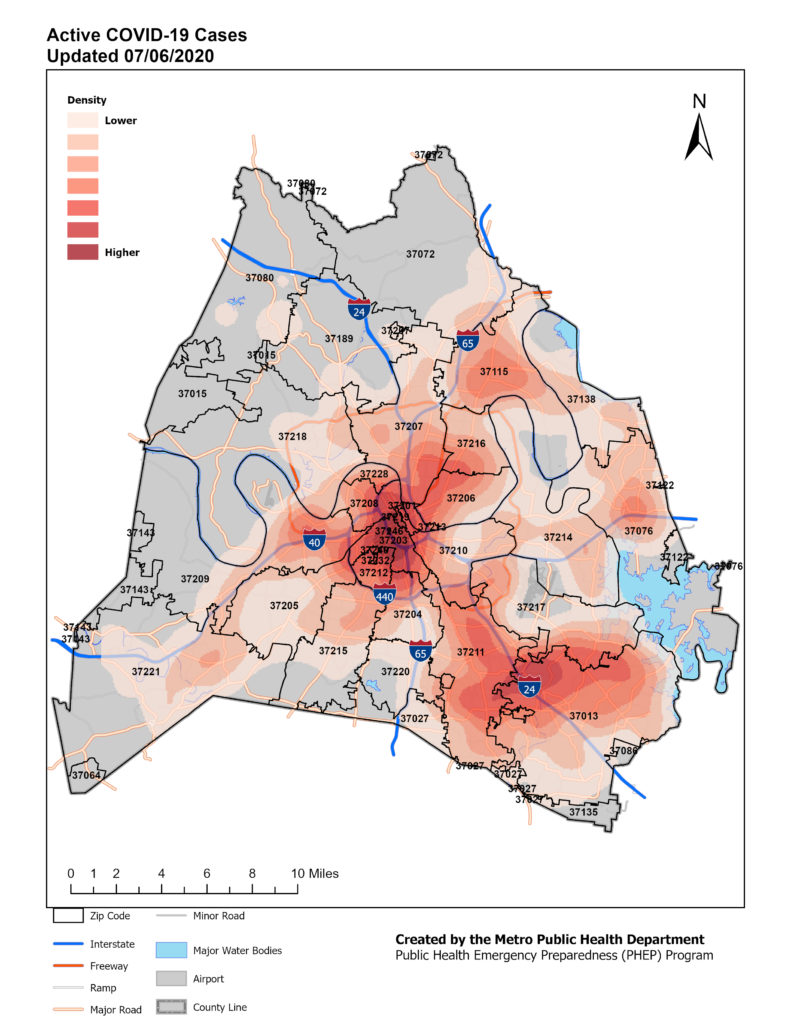
Nashville’s coronavirus epicenter is on the move from Antioch and Madison to the middle of downtown. Heat maps released by city officials today show the highest number of actively contagious cases has relocated to the urban core.
“We know that the virus is very active in that area,” says the city’s health director, Dr. Michael Caldwell. But he says it’s too early to say whether downtown dwellers are contracting coronavirus through bars and restaurants or just by living in more densely populated areas.
Late last week, the Metro Public Health Department ordered bars to close after at least 10 clusters of cases were traced back to staff and patrons.
Until this week, Nashville’s outlying areas have had the most worrisome transmission rates. Public health officials have said a major hot spot in Southeast Nashville largely represents the virus moving through Spanish-speaking immigrant households.
But household transmission now represents only one-fifth of new cases, according to Mayor John Cooper. Another one-fifth are from “non-essential workplaces.” And 16% are coming from parties, weddings and faith-based gatherings.

The number of new cases in Davidson County increased by 149 today, which is the smallest daily increase in a week. But Jahangir says the one-day downturn is not reflective of a trend. He notes that more than 2,000 people were tested at Davidson County’s three drive-thru centers on Monday, and a larger share of them are turning up positive.
The seven-day positivity rate has increased to 16% even though the city hovered around 10% for a long time. The acceptable threshold for reopening the economy has generally been 10%.
“It means this virus is very rampant in our community,” says Dr. Alex Jahangir, coronavirus task force chair.
The transmission rate in Nashville is now over 1.2, and higher than the city of Houston, where ICU capacity has become a major concern.
So far, hospital capacity in Nashville has remained in acceptable levels, though Jahangir says he will be watching those metrics closely, since it often takes a while for people sick with COVID-19 to go to the emergency room.
A noteworthy fatality
Of the five newly confirmed deaths, one is a 30-year-old male who had no known medical history. Until now, nearly everyone who has died in Davidson County has had some sort of underlying health condition.
But Cody Hamilton, an ICU nurse at Vanderbilt University Medical Center, says people are critically ill.
“These patients are, without a doubt, the sickest patients any of us who work there have ever seen,” he says. “These patients, they don’t recover quickly. They stay very, very sick for a long time.”
But more concerning to Jahangir is the rate of people over age 65 who are dying. Since March, this age group represents 850 confirmed coronavirus cases in Davidson County. In all, 85 of them have died — exactly 10%.
So Jahangir fears the millennials living downtown could trigger a subsequent wave of patients who become deathly ill.
“These young people more likely than not won’t get sick,” Jahangir says. “Two weeks from now, they could infect their parents or grandparents. Those are the individuals who will get sick.”

